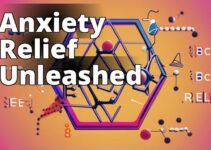What you will learn by reading this article:
- What is Delta 8 THC and how is it different from regular THC?
- The potential benefits and risks of using Delta 8 THC in addiction recovery.
- Legal and safety considerations, treatment options, and harm reduction strategies for responsible use.
Can Delta 8 THC be a game-changing solution for addiction recovery? In this comprehensive guide, we will explore the concept of Delta 8 THC, its potential benefits and risks in addiction recovery, legal and safety considerations, available treatment options, and harm reduction strategies for responsible use.
Understanding Delta 8 THC
Delta 8 THC, also known as delta-8-tetrahydrocannabinol, is a cannabinoid found in both hemp and cannabis plants. It is structurally similar to Delta 9 THC, the psychoactive compound responsible for the “high” associated with marijuana. However, Delta 8 THC is considered to be less potent than Delta 9 THC, resulting in milder psychoactive effects.
Unlike Delta 9 THC, which is present in significant quantities in marijuana, Delta 8 THC occurs naturally in very low concentrations. It can be derived from hemp through a process called isomerization, where Delta 9 THC is converted into Delta 8 THC. This process allows for the production of Delta 8 THC products that comply with federal regulations.
The Potential Benefits of Delta 8 THC in Addiction Recovery
Managing Withdrawal Symptoms
One potential benefit of Delta 8 THC in addiction recovery is its ability to help manage withdrawal symptoms. Individuals recovering from substance abuse may experience discomfort and cravings during the withdrawal process. Delta 8 THC has been reported to have analgesic and anti-nausea properties, which could potentially alleviate some of these symptoms.
It's important to note that while anecdotal evidence suggests that Delta 8 THC may help with withdrawal symptoms, scientific research is lacking. The limited research available focuses primarily on Delta 9 THC and other cannabinoids. Therefore, more studies specifically examining the effects of Delta 8 THC on withdrawal symptoms are needed.
Harm Reduction Tool
Another potential role of Delta 8 THC in addiction recovery is as a harm reduction tool. Some individuals may be using more harmful substances, such as opioids or alcohol, to cope with cravings or manage stress. Delta 8 THC, with its milder psychoactive effects, may serve as a less harmful alternative for individuals seeking to reduce their reliance on more dangerous substances.
Again, it's important to stress that the use of Delta 8 THC as a harm reduction tool should be approached with caution and under the guidance of healthcare professionals. It is crucial to consider individual circumstances, addiction history, and potential interactions with other substances or medications.
Personal Experiences
Many individuals in addiction recovery have reported positive experiences with Delta 8 THC. They claim that it helps them manage cravings, reduce anxiety, and improve their overall well-being. These personal experiences highlight the potential for Delta 8 THC to play a role in supporting individuals during their recovery journey.
However, it is essential to recognize that personal experiences may vary, and what works for one person may not work for another. Additionally, personal experiences alone cannot replace scientific research and evidence-based approaches to addiction recovery.
| Potential Benefits of Delta 8 THC in Addiction Recovery | Potential Risks and Considerations |
|---|---|
| – Managing withdrawal symptoms | – Potential for addiction or dependence |
| – Harm reduction tool | – Legal uncertainties and restrictions |
| – Positive personal experiences | – Lack of scientific research on addictive potential |
| – Lack of long-term safety data |
Personal Story: Sarah's Journey to Recovery with Delta 8 THC
Sarah, a 32-year-old woman, had been struggling with opioid addiction for several years. She had tried various treatment options but found it difficult to manage her withdrawal symptoms and cravings. Desperate for a solution, she began researching alternative approaches to addiction recovery and came across Delta 8 THC.
After consulting with her healthcare provider, Sarah decided to give Delta 8 THC a try. She started by using Delta 8 THC products to help manage her withdrawal symptoms, such as nausea, anxiety, and insomnia. To her surprise, she found that Delta 8 THC provided her with relief and made the detoxification process more manageable.
As she continued her recovery journey, Sarah also noticed that Delta 8 THC helped reduce her cravings for opioids. It helped her stay focused on her goals and maintain her sobriety. Sarah shared her experience with her support group, and some of her peers who were also struggling with addiction found similar benefits from using Delta 8 THC.
However, Sarah was aware of the potential risks and concerns surrounding the use of Delta 8 THC in addiction recovery. She made sure to use it responsibly, following her healthcare provider's recommendations and seeking professional help when needed. She understood that Delta 8 THC was not a magic solution but a tool that, when used in conjunction with other treatment options, could support her recovery journey.
Sarah's story highlights the potential benefits of Delta 8 THC in addiction recovery. It showcases how it can help individuals manage withdrawal symptoms and cravings, ultimately contributing to their overall well-being and sobriety. However, it's important to note that Sarah's experience is anecdotal, and more research is needed to fully understand the efficacy and safety of Delta 8 THC in addiction recovery.
Remember, if you or someone you know is struggling with addiction, it's essential to seek professional help and guidance. Healthcare professionals and addiction specialists can provide personalized support and help individuals make informed decisions about their recovery journey.
The Potential Risks and Considerations
The use of Delta 8 THC in addiction recovery is not without its risks and considerations. One of the main concerns surrounding the use of Delta 8 THC is the potential for addiction or dependence. While Delta 8 THC is considered to be less potent than Delta 9 THC, it still acts on the same receptors in the brain and can lead to dependence with chronic use.
It's important to distinguish between tolerance, dependence, and addiction. Tolerance refers to the body's reduced response to a substance over time, leading to the need for higher doses to achieve the desired effects. Dependence occurs when the body becomes reliant on the presence of a substance to function normally. Addiction, on the other hand, involves compulsive drug-seeking behavior despite negative consequences.
Scientific research specifically examining the addictive potential of Delta 8 THC is limited. However, it is crucial for individuals in addiction recovery to be mindful of their substance use and to seek help if Delta 8 THC use becomes problematic.
Legal and Safety Considerations
The legal status of Delta 8 THC is currently uncertain. While Delta 8 THC derived from hemp is legal under federal law, some states have implemented restrictions or bans on its sale. It is essential to familiarize oneself with the specific laws and regulations in your state before considering the use of Delta 8 THC.
Furthermore, the lack of industry regulation and the potential mislabeling of Delta 8 THC products present safety concerns. The Food and Drug Administration (FDA) has not evaluated or approved Delta 8 THC for any specific use. This means that the long-term effects and safety of Delta 8 THC are still unknown.
Individuals in recovery from substance use disorders should carefully consider the legal and safety implications of using Delta 8 THC. It is advisable to opt for products from reputable manufacturers and to prioritize transparency and quality when making purchasing decisions.
Treatment Options and Support
If you or someone you know is struggling with addiction, it is essential to seek professional help and support. Treatment options for marijuana addiction, including Delta 8 THC addiction, are available. Reputable addiction treatment centers specialize in providing comprehensive care and support tailored to individual needs.
Buckhead Behavioral Health in Atlanta, for example, offers premier addiction treatment for individuals seeking help with marijuana or Delta 8 THC addiction. Their experienced team provides personalized treatment plans and evidence-based approaches to support individuals in their recovery journey.
In addition to professional treatment options, various resources and support groups are available for individuals seeking assistance with addiction recovery. These resources can provide guidance, education, and a sense of community for those navigating the challenges of recovery.
Harm Reduction Strategies and Responsible Use
For individuals who choose to use Delta 8 THC while in addiction recovery, it is essential to approach its use responsibly. Here are some harm reduction strategies to consider:
- Moderation: Use Delta 8 THC in moderation and avoid excessive or frequent use.
- Self-Monitoring: Pay attention to your thoughts, feelings, and behaviors to ensure that Delta 8 THC use remains controlled and does not interfere with your recovery goals.
- Open Communication: Maintain open and honest communication with your healthcare professionals or addiction specialists. Discuss your use of Delta 8 THC and any concerns or challenges you may be facing.
- Prioritize Well-being: Remember that addiction recovery is a holistic journey. Prioritize your overall well-being, including physical, mental, and emotional health.
It is crucial to continually reassess your use of Delta 8 THC and make adjustments as necessary. If you find that Delta 8 THC use is negatively impacting your recovery or leading to addiction, it is essential to seek help and support from healthcare professionals or addiction specialists.
Conclusion
Delta 8 THC presents both potential benefits and risks in addiction recovery. While some individuals report positive experiences with the use of Delta 8 THC, it is crucial to approach its use with caution and consult with healthcare professionals or addiction specialists. The lack of scientific research, legal uncertainties, and potential for addiction or dependence necessitate careful consideration and informed decision-making.
If you or someone you know is struggling with addiction, it is important to seek professional help and support. Reputable addiction treatment centers, such as Buckhead Behavioral Health in Atlanta, offer specialized care and resources for individuals seeking assistance with marijuana or Delta 8 THC addiction.
Remember, addiction recovery is a personal journey, and what works for one person may not work for another. Prioritize your well-being, make informed decisions, and seek guidance from trusted professionals. With the right support and resources, you can navigate your path to recovery and reclaim a fulfilling life.





